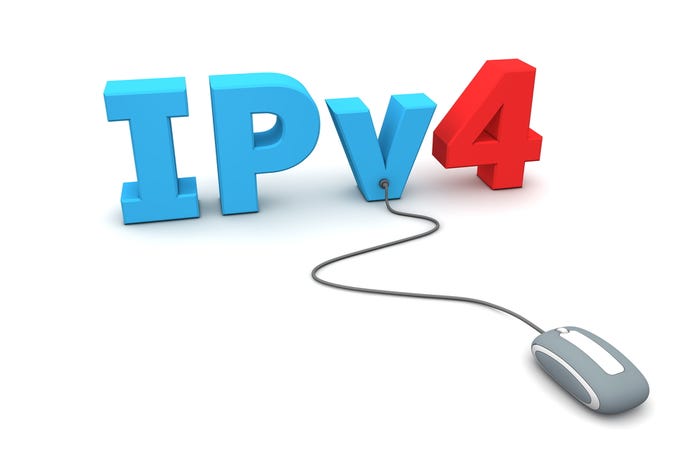IPv4 Address Market: 4 Things to KnowIPv4 Address Market: 4 Things to Know
Despite IPv6, the transfer market for IPv4 addresses is thriving. An Interop ITX expert explains.
January 24, 2018

When the American Registry for Internet Numbers (ARIN) ran out of IPv4 addresses in 2015, it served as another reminder that companies should migrate to IPv6 if they haven't already. It also drove the private market for IPv4 addresses to new heights.
Some companies still needed additional IPv4 addresses after the free pool of addresses at ARIN was exhausted. To meet that need, they turned to other companies that had extra IPv4 addresses and offered to buy them.
These private transactions began taking place several years before ARIN ran out of IPv4 addresses. In the years since exhaustion, the size of the market has grown substantially.
Marc Lindsey, president of Avenue4 LLC, a broker and advisory firm that helps companies sell IPv4 addresses, said that in 2017, 30.8 million addresses in ARIN were transferred from one owner to another. For comparison, in 2014, before depletion, the transfers in ARIN totaled only about 5.8 million. And given that ARIN is one of five Regional Internet Registries (RIRs), the total market is much larger.

IPv4.jpg
To learn more about this hidden market, Network Computing asked Lindsey what network administrators and managers need to know about buying and selling IPv4 addresses.
1. It's legal to sell your excess IPv4 addresses.
In the early days of the IPv4 market, "Many sellers didn't know that they could sell," said Lindsey. "There was this conventional wisdom -- which was completely a fallacy -- that it was unlawful to sell addresses. It was never unlawful."
As it became obvious that companies wanted to buy and sell address space, the RIRs got involved. "ARIN adopted some rules in 2009 to facilitate transfers between organizations," said Lindsey. "Up until 2009, there was no registry/governance/set of rules that would allow an entity… to hand over addresses to another company and cause the RIRs to show that change of ownership."
After that rule change, organizations could transfer ownership of addresses, as long as they met ARIN's criteria for the transfer.
2. The market isn't well regulated or well understood.
If you want to sell stock in a company, you can do that on the New York Stock Exchange or the NASDAQ. If you want to sell your old belongings, you can do that on eBay or Craig's List. But if you want to sell your IPv4 addresses, there is no central marketplace that can help you find buyers.
"ARIN had transfer policies, but those transfer policies didn't dictate or govern how buyers and sellers would get together," explained Lindsey. "It didn't provide any market oversight in terms of what the market would require."
As a result, the market was really inefficient in the early days, he said. Over the years, a group of intermediaries, brokers and lawyers with experience with these transactions, began facilitating sales.
"There still isn't an efficient mechanism for buyers and sellers to meet on quantity and price," said Lindsey. But today, the intermediaries make it somewhat easier for buyers and sellers to find each other.
3. A few buyers dominate the market.
Within the IPv4 market, a few buyers make most of the purchases. Many of them are cloud computing vendors, Internet service providers (ISPs) or software companies who want to have IPv4 addresses available to bundle with products they are selling to their own customers.
"There are now many successful buyers, repeat buyers. . . who have professional staffs and this is what they do all year," said Lindsey.
Most sellers, on the other hand, will only ever participate in a couple of these transactions, and they don't have the same data or expertise at their disposal.
If you want to get a good deal, Lindsey said, "You need to get yourself a good advisor. It can be a lawyer. It can be a broker." He added, "Get an advisor who can advise you across the range of full risk and opportunity it presents."
4. Now is a great time to sell.
If your company does have excess IPv4 addresses, you might want to think about selling them very soon.
"We're reaching a point in time when supply is constraining," Lindsay explained. "So as a result, in the last 12 months, we have seen a dramatic increase in price. Prices have nearly doubled." He expects prices to peak in the next year and a half.
Learn more about the IPv4 address market at Interop ITX where Lindsey will present "Surviving Address Exhaustion: How to Navigate the IPv4 Market Successfully."
![]()
Get live advice on networking, storage, and data center technologies to build the foundation to support software-driven IT and the cloud. Attend the Infrastructure Track at Interop ITX, April 30-May 4, 2018. Register now!
About the Author
You May Also Like




